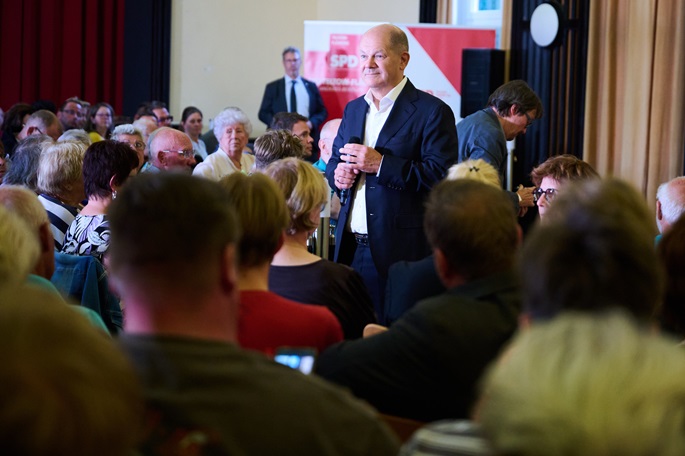Scholz rules out Taurus missiles for Kiev
Published : 21 Sep 2024, 21:04
German Chancellor Olaf Scholz reiterated he would not provide long-range missiles to Ukraine as he sought to win over voters in Brandeburg on Friday ahead of key elections.
Scholz spent the day campaigning for his Social Democratic Party (SPD) ahead of Sunday's vote in the eastern state, where his party is being challenged by the extremist Alternative for Germany (AfD).
Scholz reassured a gathering of voters that Germany would not provide Ukraine with Taurus cruise missiles, even though Kiev has been calling on Western supporters for months to provide better weapons as it seeks to repel Russian forces.
Ukraine has been fighting off a full-scale Russian invasion for more than two and a half years. Despite Western backing, the war has expanded to Russian territory as Ukrainian troops press into Kursk in a bid to bring Russian President Vladimir Putin to the negotiating table.
"Although many have urged me, I will not deliver cruise missiles that reach as far as Moscow," Scholz told a meeting in Brandenburg. "I can and will assure you at this point: I will stick to this position."
Brandenburg is governed by the SPD under Premier Dietmar Woidke, but Scholz's party is neck-and-neck with the far-right AfD in polls ahead of Sunday's vote.
However, Scholz is hoping that the SPD can retain its hold on the state, pointing to its strong economic growth in recent years.
"For me, it is very important that Brandenburg continues to progress in the future," Scholz told dpa on an earlier visit to a film museum in the state capital of Potsdam, near Berlin.
"The state has enormous economic growth - and that has a lot to do with Dietmar Woidke," the chancellor said.
Scholz called his colleague a "first-class premier" and said the state's residents, including himself, want Woidke "to remain as head of government in Brandenburg."
The chancellor also said that he has already sent in his postal vote, as he is due to attend a United Nations summit in New York on Sunday.
Woidke had previously stated that he would resign if the SPD does not win the election in Brandenburg, but polls suggest the party is in a tight race with the AfD.
A survey released on Thursday by public broadcaster ZDF shows the AfD on 28%, just ahead of the SPD on 27%.
The Brandenburg SPD is thus far ahead of the national party, which has been languishing in the polls due to the struggles of Germany's SPD-led coalition government in Berlin.
Germany's three-way federal coalition, between the SPD, Greens and pro-business FDP, is struggling with low ratings nationwide.
In recent state elections, lawmakers have been battling the growing power of extremist parties, particularly the far right, amid growing disenchantment with mainstream politics in the former East Germany.
Woidke has largely avoided campaign appearances with Scholz, seeking to disassociate himself from the unpopular chancellor.
But if the AfD wins on September 22, it would be only the second time they have achieved this in a state election since they were founded.
Earlier this month, they won their first state election in Thuringia.


